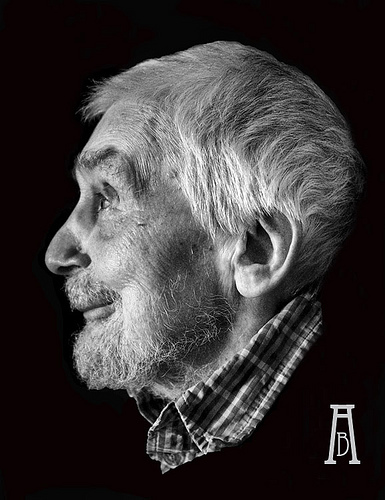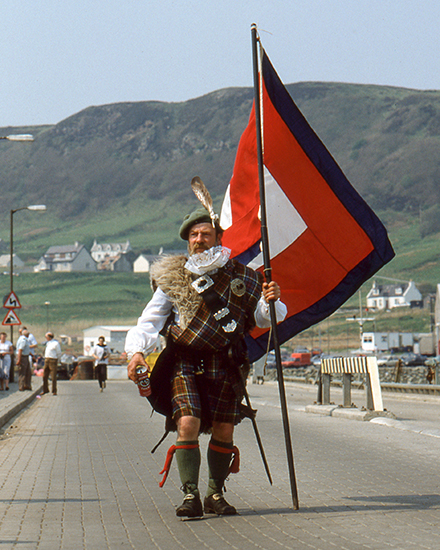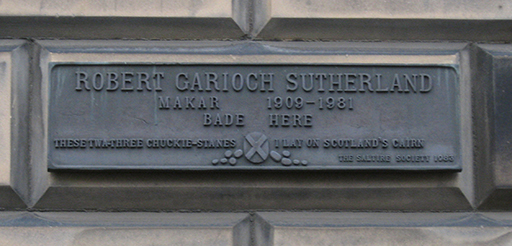18. Introductory handsel
A Scots word and example sentence to learn:
Makar [Tip: hold Ctrl and click a link to open it in a new tab. (Hide tip)]
Definition: One who fashions, constructs, produces, prepares, etc.
Example sentence: “Pairlament walcomes the annual celebration o Scotland’s national makar, Robert Burns...”
English translation: “Parliament welcomes the annual celebration of Scotland’s national poet, Robert Burns...”
Activity 2
Click to hear the sentence above read by a Scots speaker.
You can then make your own recording and play it back to check your pronunciation.
Transcript
Listen
Pairlament walcomes the annual celebration o Scotland’s national makar, Robert Burns.
Model
Pairlament walcomes the annual celebration o Scotland’s national makar, Robert Burns.
Go to the Dictionary of the Scots Language for a full definition of the word
Language Links

The word makar is a Scots term for poet, literally, a ‘maker of poems’. The craft as well as the art suggested by the term is important because it emphasises that poems are made for a purpose, and many poets before the Romantic era (c.1770–1830) had specific purposes in mind.
In the Medieval and Renaissance world, all art was didactic, and the major Scots language poets of c.1425–1550, Robert Henryson, William Dunbar, Gavin Douglas and David Lyndsay, all had things to teach their readers. They also had defined social roles, at court, in the church or as teachers. The word ‘Makar’ was revived among our contemporaries when Edwin Morgan was appointed the first ‘Scots Makar’ in 2004. He was followed by Liz Lochhead in 2011 and Jackie Kay in 2016. Morgan expressed some concern that the term suggested something antiquated but he and his successors came to welcome it as distinctively Scottish, as opposed to the designation ‘Poet Laureate’.
Each of these modern poets used their role in this public office to write on public events and political change that affected people, generally in Scotland. The Romantic idea of the isolated voice, lyrically speaking of personal experience, was less important than the social location of a poet speaking on behalf of, and addressing a wider public. This was exemplified in Morgan’s poem for the opening of the Scottish parliament in 2004, ‘Open the Doors!’.
The poem is mainly in English but uses Scots phrases when declaring what people do not want of their politicians: ‘What do the people want of the place?’ he asks:
‘A nest of fearties is what they do not want.
A symposium of procrastinators is what they do not want.
A phalanx of forelock-tuggers is what they do not want.
And perhaps above all the droopy mantra of “it wizny me” is what they do not want.’
Related word:
Definition: Twisted, crooked, perverse, bad-tempered, oppositional
Example sentence: “Mony eens hiv windered if Stevenson insistit oan scrievin his story ‘Thrawn Janet’ in Scots cause it is a folk tale...”
English translation: “Many people have wondered if Stevenson insisted on writing his story ‘Thrawn Janet’ in Scots because it is a folk tale...”
Activity 3
Click to hear the sentence above read by a Scots speaker.
You can then make your own recording and play it back to check your pronunciation.
Transcript
Listen
Mony eens hiv windered if Stevenson insistit oan scrievin his story ‘Thrawn Janet’ in Scots cause it is a folk tale.
Model
Mony eens hiv windered if Stevenson insistit oan scrievin his story ‘Thrawn Janet’ in Scots cause it is a folk tale.
Go to the Dictionary of the Scots Language for a full definition of the word

Hugh MacDiarmid’s poem ‘The Sauchs in the Reuch Heuch Hauch’ contains the word ‘thrawn’ which here suggests a quality of devilish twistedness, a refusal to obey authority. In the poem, the people (‘we’) might ‘come doon’ from stormy moods of anger, intoxication, passion, troubled feelings, and settle down gently ‘like a bird i’ the haun’’ but these sauchs – willow trees, twisted out of shape by prevailing winds – are unchanging and unpersuadable in their opposition to any establishment power.
Introduction

